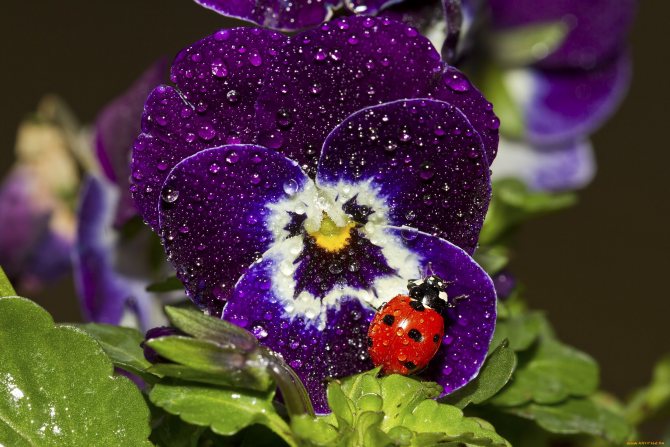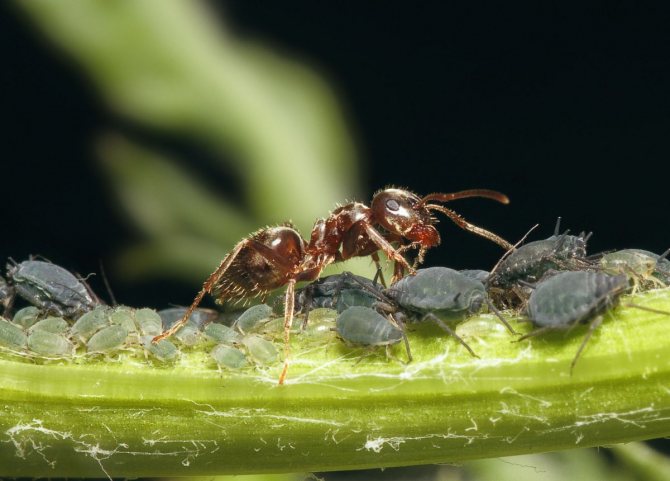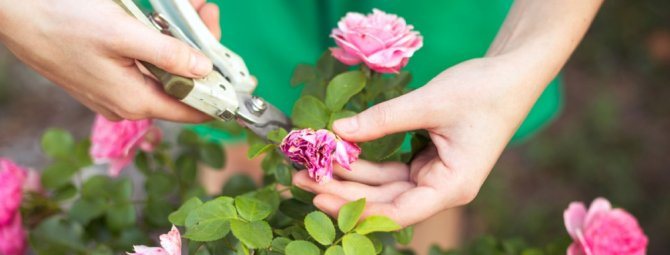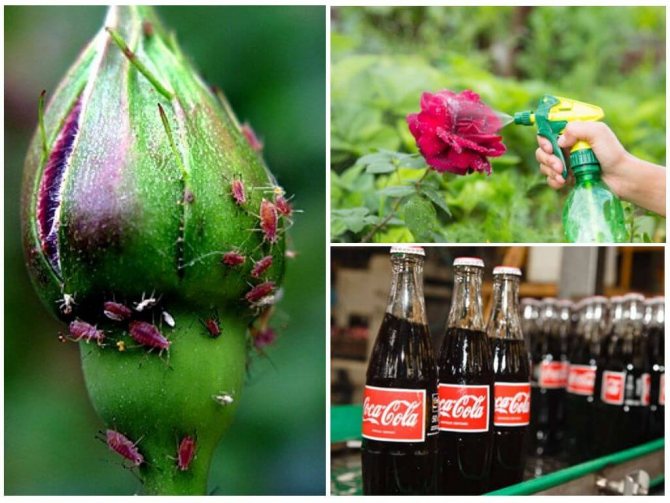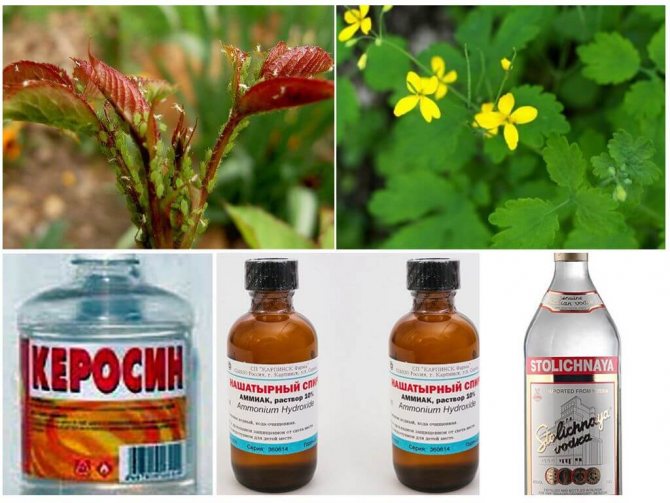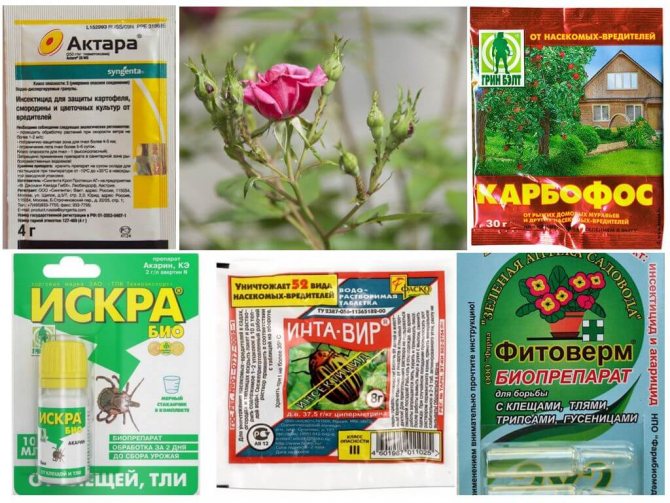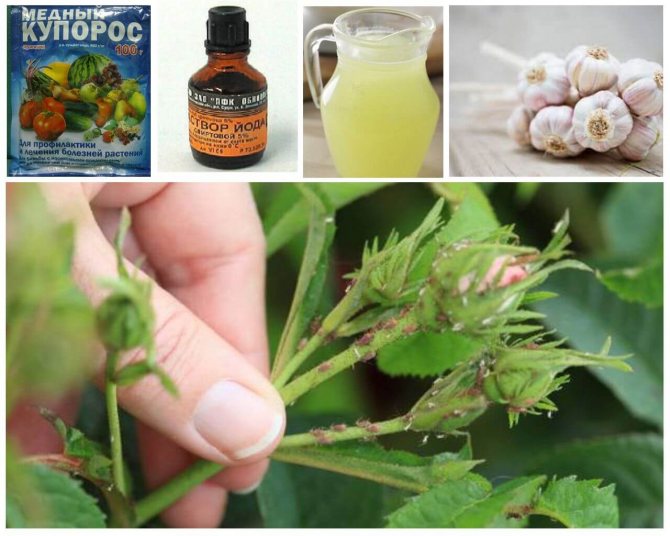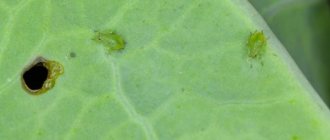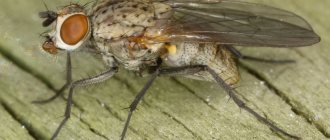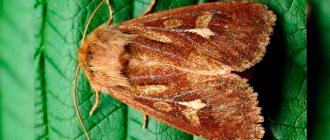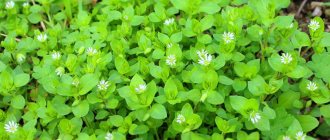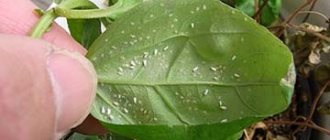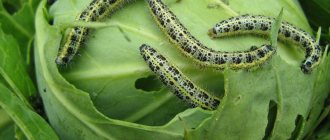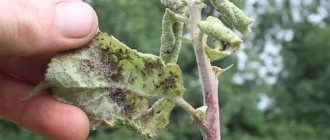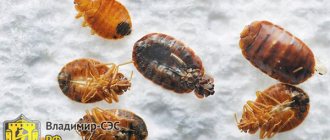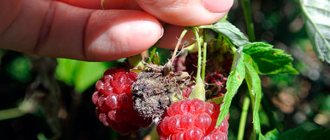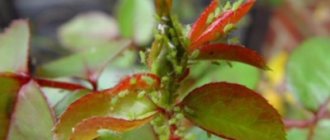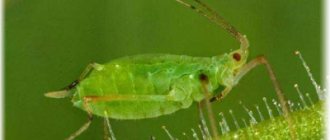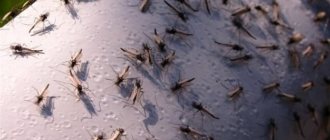Why aphids are dangerous for roses
Aphids are a pest whose purpose is to destroy the rose. The insect multiplies rapidly, conquering more and more territory on the plant.
Several significant signs can be distinguished by which it is easy to determine the defeat of a flower by aphids:
- ants are actively crawling over the plant;
- the sheet plate becomes thinner;
- the rose looks lifeless.
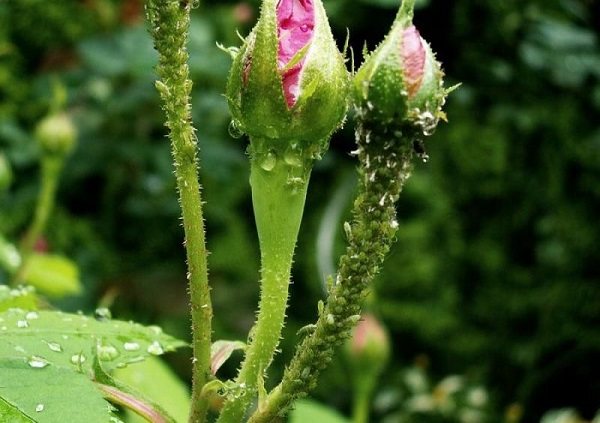
Aphids suck all the nutritious juices from the bush. There is a deformation of the tops of the shoots and the buds themselves. The leaves curl up, turn yellow and fall off. The pest secretes a sweet liquid. The viscous secret with its taste literally attracts ants who run to feast on them.
These green midges pose serious harm to rose bushes:
- Green aphids spoil the appearance of the rose, is a carrier of various diseases.
- The sweetish liquid that insects secrete serves as a breeding ground for the destructive fungus.
- Females give birth to about 200 individuals every two weeks and quickly multiply the colony.
- Aphids are dangerous to many crops and can destroy an entire garden.
Gardeners with many years of experience are sure that this pest is the carrier of many phytopathogenic viruses.
Biological characteristics and ways of aphid infestation
It is almost impossible to confuse aphids with any other pest. In a short time, these insects are able to form a large colony and completely stick around a potted rose.
Of the more than four thousand species of aphids on roses, most often you can see the green rose aphid (Macrosiphum rosae), which also affects rose hips, apple trees and pears. The adult founding female has a light green body 3.5-3.8 mm long with black paws, antennae and ends of juice tubes. It is wingless and, in a parthenogenetic manner, is capable of spawning up to eight dozen larvae.
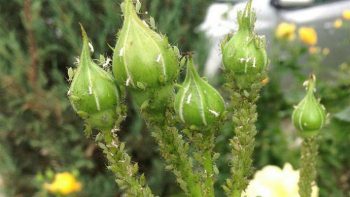

Aphid colonies are most willing to destroy young shoots and rosebuds.
Each of the larvae, molting, also becomes a parthenogenetic female and, in turn, gives life to the next generation. In the third generation, winged females appear, which fly in search of food plants and lay new colonies. Aphids get on indoor roses from the street. This usually happens in the following ways:
- during ventilation, through an open window;
- while “walking” home roses on balconies and terraces;
- with plants brought into the house (including bouquets);
- during transplantation into contaminated soil;
- with a person or pets - on clothes or wool.
Due to parthenogenetic reproduction, even one insect or larva, entering the house, creates a threat to the safety of plants.
How to treat rose aphids
Having discovered a problem, gardeners are trying to find the best way to treat aphid rose in order to get rid of it as soon as possible. There are many methods: both chemical and biological, and folk.
On a note! There are also natural enemies that help destroy flower pests. You can irrigate the bush with a slight pressure of water or collect aphids by hand.
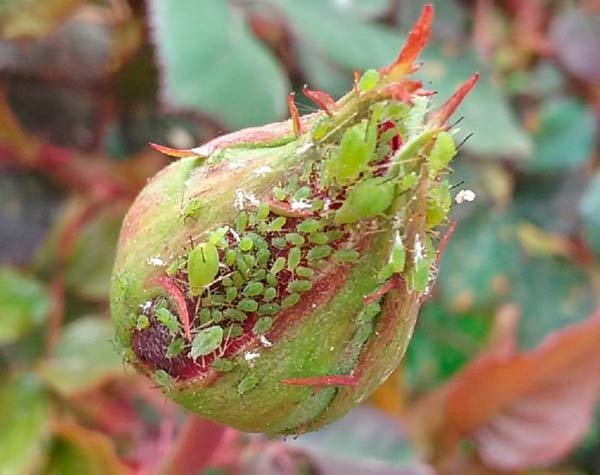

Photo of aphids on a rose
Folk remedies
A good effect is the use of folk remedies for pests. They are able to protect roses from aphids, but only in the initial stages of damage. These products will not harm neighboring plants and are inexpensive.
Soda
Baking soda works well for aphids.You need to take 10 liters of soapy water and dissolve 3 tbsp. spoons of soda. Mix the mixture thoroughly and moisten the crown well with it.
Ammonia
Ammonium is nitrogen, which is easily and quickly absorbed by plants, getting on the soil and leaves. Treatment with this agent not only contributes to the destruction of the pest, but also accelerates the growth and flowering of green spaces.
Add 50 ml of ammonia to the soap solution. The resulting liquid is treated with buds, leaves and young shoots. Spraying of plants should be done twice a month.
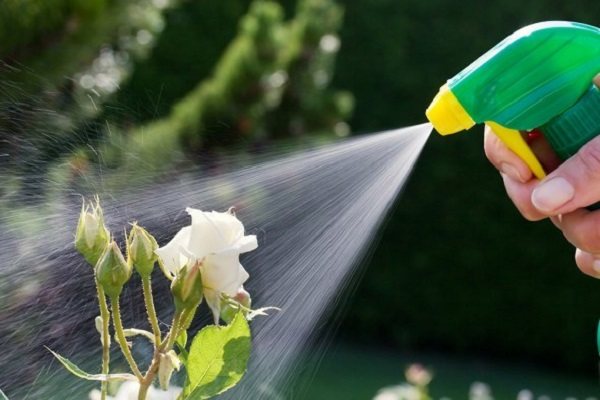

Soap
Use only laundry soap. It can be liquid or classic in a bar. Toilet soap cannot be used, since it contains aromatic additives that will lure insects even more.
If aphids appear on the rose, then prepare the following solution:
- Grate solid soap.
- Then four tbsp. Dissolve tablespoons of shavings in 1 liter of water and strain.
- Fill a sprayer with the mixture and treat the bushes well.
- The procedure is carried out twice a month or every time after heavy rainfall.
Wood ash
This is a simple and versatile aphid remedy that will help treat flowers and can be applied to any plants in the garden. You need to take 300 or 400 g of sifted ash and stir it in 10 liters of water. Then put on low heat for several hours.
After that, cool the broth completely and strain. It is the lower parts of the leaves that are thoroughly irrigated. For the best effect, repeat the treatment of the plant every other day.
Tobacco tincture
To prepare a solution, pour half a glass of tobacco dust into one liter of water. Then simmer the mixture for about 30 minutes over low heat. Cool and stand for 24 hours. Add another 1 liter of water and 20 g of crushed soap. Mix the resulting liquid well. The composition for spraying roses from pests is ready.
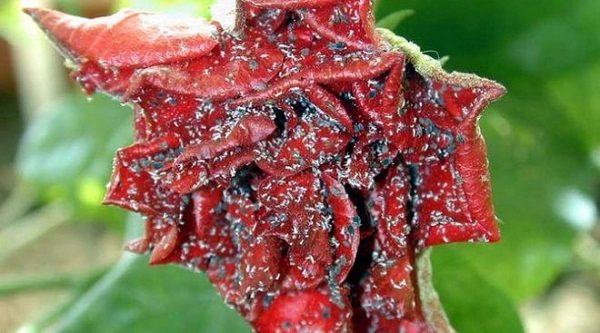

Why aphids are dangerous
Garlic tincture
Garlic will help remove aphids from a rose. Thoroughly chop two large heads of garlic together with the husk. Then combine with water and stir. Withstand the resulting mass for a day and strain. Process the bushes with a mixture several times per season. The tincture is effective against ticks and weevils.
Onion peel
An excellent weapon against aphid colonies can be a simple onion husk, it helps to fight against many parasites. Two hundred grams of onion husks are poured with a liter of warm water. Let it brew for five days, and then filter. The mixture is sprayed on the affected shrubs.
Coca-Cola against pests
A favorite drink, Coca-Cola, will help save a rose from aphids. It contains phosphoric acid, which destroys aphids, and glucose. After treatment with cola, insects quickly die and do not produce offspring for a long time. Plants are free from pests and grow quickly.
Several cooking recipes:
- Mix cola with water in a ratio of 2: 7 or 5: 1. Shake everything well. When the foam subsides, you can start spraying.
- Release all gas from the drink and dilute half with water. You can add a small amount of tar soap. Spray the solution twice a month.
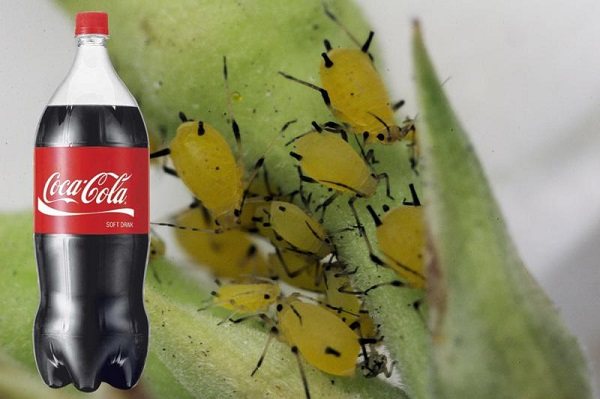

Tomato tops
If the rose is attacked by aphids, then prepare such an infusion. Pour 3 or 4 kg of tops with water and boil for about 30 minutes. Dilute the broth in a ratio of 1: 5. Add 35-40 g of laundry soap to 10 liters of solution. Spray on bushes affected by insects.
Vinegar
Add 2 tbsp for 5 liters of water. l. vinegar essence. Mix the entire solution thoroughly and sprinkle the roses from the aphids.
Preparations for aphids on roses
Pest spray products are best purchased from specialized stores. They monitor the quality of products and will be able to advise on the use of the drug.
Fitoverm
This is the best protection against aphids for roses. The tool belongs to biological products and is very popular among gardeners and farmers.It can be applied to flowers as well as shrubs and trees. The solution is prepared as follows: 3 ml of the drug is diluted in 10 liters of water. Irrigation is carried out up to three times per season.
Spark
An effective drug that, after several uses, does not cause addiction to insects. The cost is low, and the additives contained in it help the flowers to recover and bloom actively.
The preparation procedure is simple: 1 tablet per bucket of water. The result is a suspension that is not washed off the plant for a long time, protecting it from green midges.
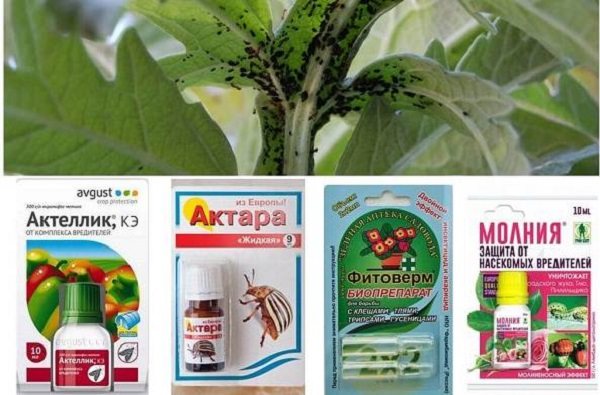

Aktara
The drug is universal, since it is not influenced by moisture indicators, weather conditions. The active substances in the composition are easily absorbed by the leaves. The plant becomes invulnerable to most pests. The product is completely biodegradable in the soil. Two hundred grams of the substance is dissolved in 10 liters of water.
Fufanon
It is an organophosphate pesticide. Available in the form of an emulsion. Dilute the solution in 10 liters of water with 14 ml of the product. Provides plant protection for three weeks. Processing is carried out once.
Biotlin
Acts at the cellular level. Provides protection for 30 days, since it is located in the plant itself and is not washed off by precipitation. It is necessary to use 5 ml of Biotlin for 10 liters of water. One treatment per season is enough.
Tanrek
Included in the top ten products. Contains the active ingredient imidacloprid.
Aktofit
Acts on the basis of the substance aversectin-C. By the principle of action and application, it resembles Fitoverm.
Important! When using chemicals, strictly follow the instructions in the instructions. Observe safety rules. When choosing a product, purchase more environmentally friendly biological products.
What kind of aphid insect and the reasons for its appearance
If aphids have appeared on the roses, it is very easy to recognize it and distinguish it from other insects. These are small bugs with an oval-shaped body. Their color can be different depending on the species, age and habitat. So, there is a green aphid: a bug that disguises itself as the color of young leaves and grass. There are also white aphids, and it is even easier to see it by its characteristic milky body color. The bug is transparent, and its length varies from two to seven millimeters, so it is quite possible to notice it with a simple eye and take action in time.
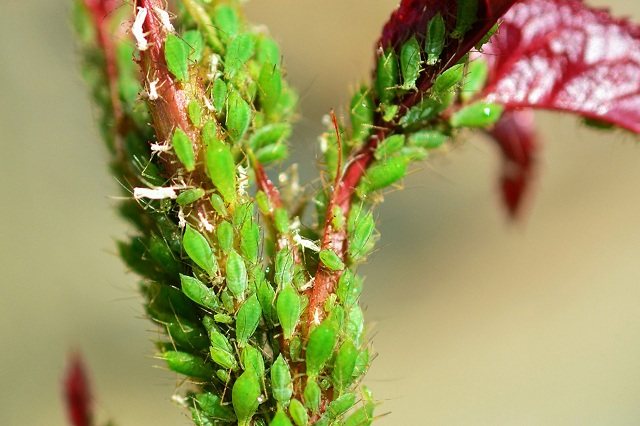

The reasons for the appearance of these bugs, mainly, is that it is the rose that serves as the main delicacy for them, along with other garden crops. The pest wakes up in the month of April along with flowers and shrubs, actively grows, multiplies and spreads in the garden in search of food.
How to spray correctly
Only with the correct treatment procedure with chemical or folk remedies, you can achieve a good result. It is better to prepare the working solution outdoors, and not in a residential area.
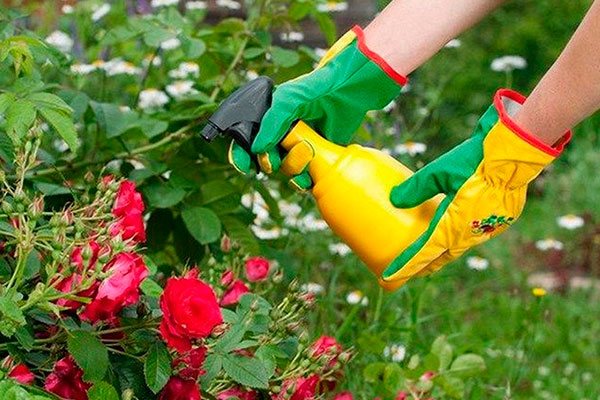

Roses have very sharp thorns, so you need clothing that covers all parts of the body, made of dense material. When it comes to working with chemicals, then you need to take care of a respirator, gloves and glasses.
At the sprayer, set a wide spray mode to moisten leaves and stems abundantly. Aphids accumulate under the leaves and on the buds, so it is good to treat them with liquid, moving from the base of the shoots to the tops.
Irrigation should be carried out in calm weather in the evening. Frequency of treatments is weekly until the roses are healthy again.
The use of chemicals
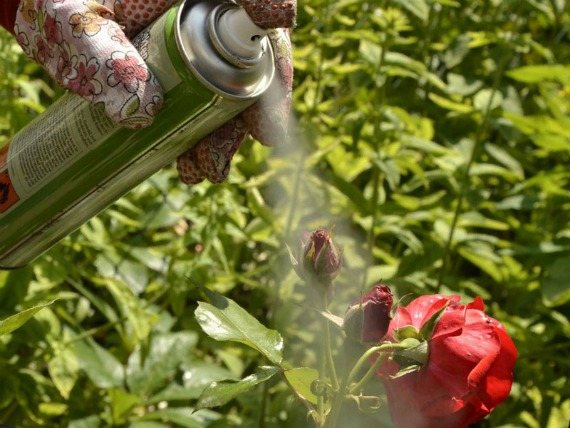

Often, in order to achieve greater efficiency and with a massive defeat of rose bushes by aphids, it is necessary to resort to chemical control measures. But it is advisable to take into account the location of the rose garden and use chemicals near fruit bushes and trees and near vegetable beds, the fruits of which are already ripe and ready to eat.
The following chemicals are used to treat roses:
Chemical preparations give a 100% guarantee of the death of the pest on roses, but they are also dangerous for beneficial insects, birds, domestic animals and humans. Therefore, during the processing of flowers, it is necessary to use personal protective equipment: a respirator, glasses, a hat, gloves.
Another significant disadvantage of this method of treating roses against aphids is that rose petals cannot be used either in the preparation of medical and cosmetic products, or in cooking.
In rare cases, the use of chemicals can change the smell of flowers.
On a note. Aphids hatch a new generation every 2 weeks, therefore, the pest quickly adapts to the active substance. The effectiveness of the fight will lie in the alternation of drugs.
In addition, it is necessary to carry out intermediate treatments with folk remedies and not neglect mechanical methods.
Plants-neighbors
There are plants that have a strong scent. They are able to scare off aphids, which do not tolerate strong odors. Planting such green allies should be closer to the rose gardens. This will help keep the roses safe and blooming.
Aphid repellent
Plants, helpers in the fight against aphids:
- sage;
- mint;
- dill;
- marigold;
- parsley;
- lavender;
- daisies.
These are common and unpretentious crops that will not be difficult to plant on the site.
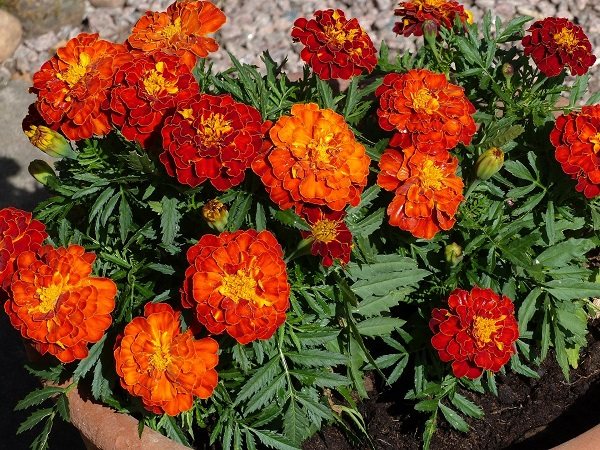

Aphid-attracting
There are shrubs and flowers that attract green midges like a magnet. It is better to plant them away from roses. Allocate space in distant flower beds.
Lure aphids:
- begonia;
- decorative poppy;
- petunia;
- nasturtium;
- mallow;
- cosmeya.
Do not plant roses next to viburnum, mulberry, linden or bird cherry.
Natural enemies
In nature, there are many natural enemies of aphids - these are birds and predatory insects that feed on it:
- The main exterminator of the insidious midge is the ladybug. She eats up to 50 aphids per day.
- Sand wasps, lacewings, crickets, cicadas, ground beetles, earwigs, toads, riders and some species of spiders love to feast on green pests.
- In addition to insects, there are also birds that eat harmful midges. These are tits, sparrows, warblers, etc.
To attract insects to the garden, you can plant herbs with a strong smell: parsley, dill, or other aromatic herbs. Feeders, drinkers or birdhouses are perfect for birds.
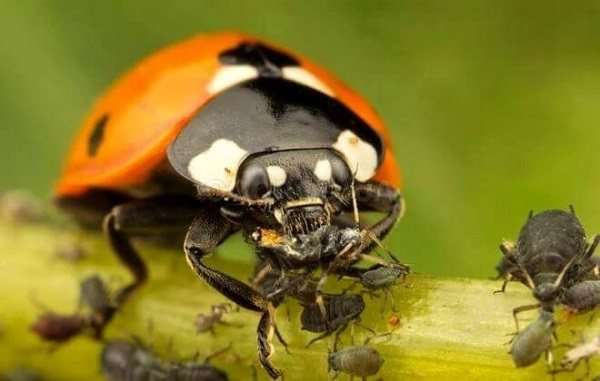

Preventive measures
To avoid the spread of aphids on roses, the following protection and prevention measures are necessary:
- systematic inspection of bushes for the presence of pests;
- cut the plant in a timely manner;
- regularly use special solutions for spraying.
Can be sprayed with soapy liquid or plain water under low pressure. For aphids, such a slight pressure is tantamount to a tornado.
It is important to prune yellowed, weakened, diseased leaves and shoots to control the spread of aphids. It is necessary to choose the right place where the rose garden will be located. Regularly provide feeding and watering, achieve optimal lighting for flowers and full care for them. All these preventive measures will protect the beautiful plant from intruders.

